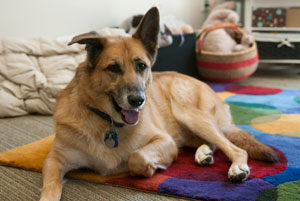Pets as Therapy
By: Rochelle Perper, Ph.D. | May 7, 2013

For those of you who visit our office regularly, and who may have come on that “special Thursday” once a month, you may have met our furry friend, Kalvin. He is a beautiful German Shepard brought to us by our Client Care Director, Rebecca. What started out as an experiment has proven to be a wonderful adjunct to therapy for some of our clients.
Research continues to show that the unconditional love and attentiveness given to us humans by our pets is a valuable therapeutic tool for treating depression and anxiety. Dr. Ian Cook , director of the UCLA Depression Research and Clinic Program continues to do extensive research on the value of human-animal relationships. He and his research team have concluded that pets can reduce tension and improve mood for all individuals, with significant results seen in the treatment of depression. The following illustrates how Dr. Cook and his team have documented how this benefit can be achieved.
Uncomplicated Love – Pets don’t come with unnecessary baggage or “drama”, they have basic needs and respond positively when those needs are met. The experience of pure gratitude, love and excitement about you can be the perfect antidote to the interpersonal challenges you are trying to navigate.
Responsibility – Deciding if you can take care of a pet is an important step, however, don’t underestimate the value of those feelings of accomplishment in caring and nurturing that an animal can provide to you. Remember the rewards come back from your pet in the form of unadulterated affection and loyalty.
Activity – One of the symptoms of depression is lethargy and lack of energy. With a pet you have someone to take on walks, roll on the floor with, chase, and just play with… all good physical activity! Moving and being physical have been documented to aid in the decrease of depression and a pet companion can aid in that process.
Routine – When depression is a part of our lives we simply get “lost” in feeling down and troubled, our routines seem to be unimportant and the motivation to regain them is difficult to find. With a pet we are engaged in routines of feeding, walking, cleaning, brushing, and interacting with them; these routines bring us stability and can help alleviate depression.
Companionship – Isolating yourself can happen when you are depressed, leading to feeling unloved and “invisible”. Having a pet assures you that you are never alone, and there is always a reminder that you are wanted and important.
Social Interaction – Take your pet for a walk and see what happens! Other pet lovers come up and ask you about your furry friend and engaging in brief and friendly chatter. You will see how your pet can bring a smile to other people with each pat and scratch behind the ears. An action that may have felt impossible in your depression or anxiety is now facilitated by the loving attention of your pet.
Touch – Studies continue to show that touch is an important part of healing, from depression to high blood pressure. Petting, stroking, combing your pet can help you in feeling connected to another living creature can help you in many ways.
Before you go out and get that new pet…
Ask yourself these important questions:
-
Are you comfortable with animals?
If you are uncertain, you may want to think twice about getting a pet now. People who were raised with or around pets growing up are more likely to benefit from a pet now. Be fair to the pet. Like humans, once they have a home they don’t want to be shuffled around.
-
Will having a pet make you worry?
Having a pet is to lower your anxiety and/or decrease your depression, if you are someone who worries about the responsibility or care of something, this might not be the best strategy.
-
Is your depression too intense right now for a pet?
Sometimes our depression is at a level where taking care of ourselves feels overwhelming at times, so taking care of pet can add to those feelings. If this is you, wait until you are feeling you can/want the companionship and affection a pet can give you.
-
Can you afford a pet?
Caring for pets can be expensive. There are licensing fees, medical care, food and grooming to name a few. Check with your local ASPCA for estimated costs to determine if a pet can fit in your budget.
So, if you want to meet Kalvin and test this out… maybe you will be one of the lucky ones who visits the office when he is here, and I guarantee you it will be a treat!



